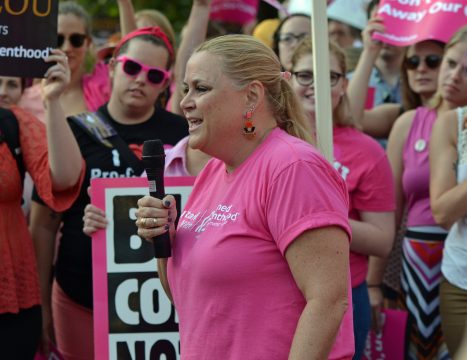JEFFERSON CITY, Mo. – Missourians are reacting to perhaps the most impactful Supreme Court decision on abortion since Casey v. Planned Parenthood. The nation’s highest court struck down two provisions of a Texas state law that they believe placed undue burden on a woman’s right to an abortion as decreed under Roe v. Wade… and could hold serious ramifications for Missouri’s laws regarding abortion access.
The court ruled 5-3 (along ideological lines with Justice Anthony Kennedy as the swing vote) in Whole Woman’s Health v. Hellerstedt that two provisions of Texas HB 2 that require abortion facilities to adhere to ambulatory surgical center (ASC) regulations and necessitate an abortion providing doctor to have admitting privileges were unconstitutional because those provisions had little to do with protecting a woman’s health.
For anyone who has followed the events of Missouri’s year-long abortion scandal which stemmed from the Planned Parenthood video controversy, the two requirements specified in the Whole Women’s Health case were central to the Senate investigation led by Sen. Kurt Schaefer, R-Columbia, that led to the temporary end of abortion access of the Planned Parenthood facility in Columbia.
Those same laws led to the closure of 22 of Texas’ 41 abortion providers in 2013 due to the cost of facility renovations required to meet the ASC requirements.

“We have found nothing in Texas’ record evidence that shows that, compared to prior law…the new law advanced Texas’ legitimate interest in protecting women’s health,” Justice Stephen Breyer said in the majority opinion. “Patients seeking these services are less likely to get the kind of individualized attention, serious conversation, and emotional support that doctors at less taxed facilities may have offered.”
President and CEO of Planned Parenthood Kansas and Mid-Missouri Laura McQuade called the decision “historic” and noted that the decision would have far-reaching implications on Missouri’s abortion statutes.
“Those two restrictions have been instrumental in making Missouri, on and off, a one-provider state,” she said. “The main hurdle that caused us to suspend our services was when the University of Missouri, under intense duress from the Missouri legislature, withdrew the admitting privileges in for our provider in Columbia. These laws dramatically impact both Planned Parenthood and independent advisors ability to provide access to safe and legal access in the state of Missouri.”
Schaefer and other conservatives on the Senate Sanctity of Life Committee questioned whether or not the facility had adhered to all of the requirements to become an ASC or if the Department of Health and Senior Services (DHSS) had been lax in granting them an ASC license. They also noted that the University of Missouri Hospital, which receives state funds, provided the Columbia abortion provider, Dr. Colleen McNicolas, with medical privileges that they felt did not meet the standard of admitting privileges. Eventually, the months long investigation led to the University of Missouri Hospital revoking McNicolas’ privileges, which led to an immediate suspension of the ASC license from the DHSS.
Most recently, Planned Parenthood of Kansas and Mid-Missouri (PPKM) won a lawsuit against the DHSS for that decision to revoke the ASC license. The judge in the case added that she felt the DHSS only acted as it did under political pressure from legislators.
Now, McQuade believes that her organization has legal standing to overturn those laws in Missouri, but they are still investigating the exact legal mechanisms that could invalidate those laws. However, she added that should those restrictions be essentially stricken from statute, Columbia and St. Louis may not be the only two cities in the state that provide abortion access.
“Once those laws are not in effect, we will immediately reinstate access to abortion services at our Columbia location and we will look at all other options across the state,” she said.
Missouri Right to Life, the primary anti-abortion proponents in the state, said this decision would give far too much leeway to abortion clinics and potentially make them a health hazard for women in the state and added they were “disappointed” in the Supreme Court’s verdict.
“These laws requiring that an abortionist have hospital privileges within 30 miles of the abortion clinic and that abortion clinics follow the same procedures as all ambulatory surgical centers are common sense safety measures and not undue burdens,” said Steve Rupp, President of Missouri Right to Life. “This decision allows the abortion industry to operate unsafe clinics and with little oversight. The court ignored recent cases of medical negligence, manslaughter and murder carried out in abortion clinics in Pennsylvania and Texas.
“Today, the court advanced the abortion agenda over the protection of women’s health.”
On the other hand, progressives and liberal-leaning groups lauded the decision.
Thank you #scotus for recognizing the Texas anti-abortion law is a step in the wrong direction. #abortionaccess https://t.co/xt4Tojaa5p
— MariaChappelleNadal (@MariaChappelleN) June 27, 2016
“Today’s Supreme Court decision means that courts will no longer play along with the legislature’s disingenuous game of pretending to help women by erecting unnecessary barriers to abortion care,” said Jeffrey Mittman, the executive director of the ACLU of Missouri. “It should mark the end of Missouri’s campaign to impose unnecessary and burdensome regulations on abortion providers for the purpose of making abortion care more difficult to obtain.” Conservative Missouri politicains, including Schaefer, lambasted the Supreme Court’s finding.
Another overreaching decision by our rulers in black robes. Court ignores precedent and strikes down health laws https://t.co/zMirxtt7aC — Bob Onder (@BobOnderMO) June 27, 2016
Schaefer argued it was actually the court that was playing a political game.
“It’s outrageous that the court would say that abortion clinics cannot be regulated like other outpatient clinics that perform invasive surgical procedures,” he said. “To distinguish it out from vein centers and other facilities that have to have that license which pose the same threats to people receiving services, there’s no basis for that other than politics.
“It’s a further example of Washington D.C. overstepping its bounds in matters of public safety in the states.”
Schaefer said he would examine the court decision in more detail over the coming days to determine how to proceed in regards to the Planned Parenthood clinic which is still in limbo given the information and documents provided by St. Louis Planned Parenthood president Mary Kogut.
Missouri gubernatorial candidate and former House Speaker Catherine Hanaway also condemned the decision.
“The Supreme Court has once again sided with the abortion industry and its unlimited abortion-on-demand agenda over the health and safety of women,” Hanaway said. “Texas’s laws requiring admitting privileges for abortionists and holding abortion clinics to the same standards as other health care facilities were clearly constitutional, and this instance of liberal judicial activism is deeply troubling.”









